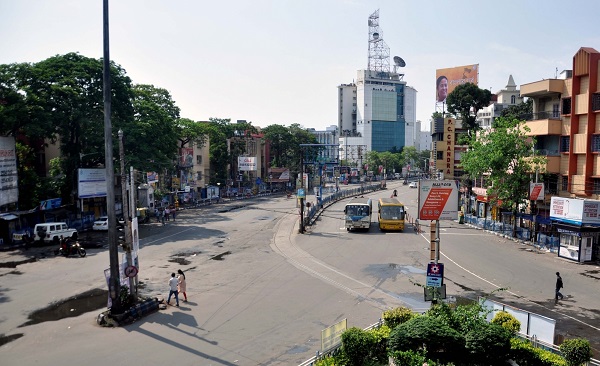
Kolkata, With few vehicles including state government buses plying, people generally stayed indoors and a vast majority of shops and markets remained closed as West Bengal went into virtual lockdown on Sunday in response to Prime Minister Narendra Modi’s call for 14-hour ‘Janata Curfew’ to prevent the spread of the deadly coronavirus infection.
While private buses did not operate, a few state buses, autorickshaws and yellow taxis could be seen on the roads but the passenger count was extremely low since the morning as 90 per cent of people on the streets were found wearing masks.
The Indian Railways has cancelled all mail, express and inter-city trains since 4 am while keeping suburban services in Kolkata to bare minimum. The Kolkata Metro is running only half of its trains which usually run on Sundays on its North-South and East-West routes. Trains are available at 30-minute intervals, but the rakes are mostly empty.
The Bengal Taxi Association is also observing a self-imposed curfew from 11 am to 5 pm, but has kept around 50 yellow cabs on standby for emergencies (toll free number 03324753505).
Netaji Subhas Chandra Bose International Airport director Kaushik Bhattacharjee told IANS that 60 per cent of domestic flights have been cancelled by various operators due to the Janata curfew. And even the flights which operated had fewer passengers.
“From Monday, the cancellations will be much less,” he said.
The central government last week banned all commercial international airlines from operating to India for a week from Sunday.
The interstate bus services to and from West Bengal have already been suspended by the state government till March 31.
The ticket counters were empty, with only a handful of passengers seen waiting for trains at the vital Sealdah and Howrah stations. The iconic Howrah bridge – considered the gateway to the eastern metropolis – was almost deserted.
The city’s arterial roads which normally bustle with people in holiday mood on Sundays, were vacant.
There were rows of closed shops and absentee vegetable and fish vendors in municipal markets across the city. Even the very few who had opened their outlets downed shutters seeing there were virtually no customers.
The state’s Mamata Banerjee government has shut all restaurants, pubs, bars, clubs, nightclubs, hookah bars, massage parlours, amusement parks, museums and zoos from Sunday morning, and ordered that all social gatherings be avoided completely, with even the unavoidable ones having bare minimum attendance till March 31.
In a notification, the state government has threatened strict legal action in case of any violation.
Similar scenes of deserted roads and closed shops and markets were seen in the districts. The state has so far recorded four confirmed coronavirus cases.









